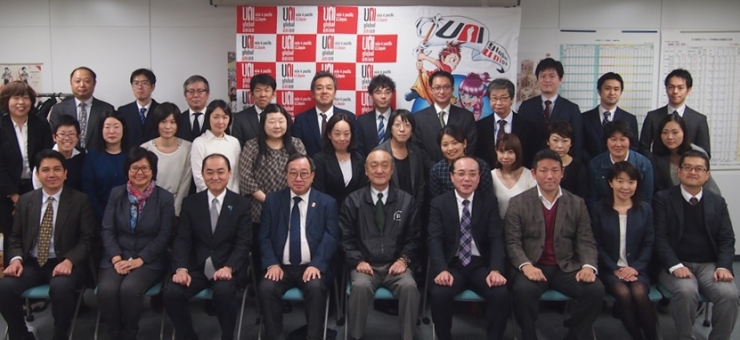Japan: 80th UNI LCJ Management Committee Meeting, 8 December 2016

The UNI Liaison Council Japan (UNI LCJ) invited Bro Christopher Ng, UNI Apro’s Regional Secretary, to speak about the latest regional developments affecting labour at its 80th Management Committee Meeting on 8 December 2016.
Bro Christopher emphasized the importance of trade unions’ role in asserting the social dimension in all ongoing regional economic processes within the Asia Pacific region such as the Trans Pacific Partnership Agreement (TPPA), the ASEAN Economic Community (AEC) and the Regional Comprehensive Economic Partnership (RCEP). It is necessary to develop mechanisms and institutions to enable all stakeholders involved to work together to ensure equitable growth that is both inclusive and sustainable.
This requires persistent efforts to bring forth a win-win situation. He highlighted the example of ASEAN Services Employees Trade Union Council (ASETUC) which amplified UNI Apro’s work in promoting labour-management partnership and building positive relations with governments in the ASEAN region. The ASETUC was formed in 2007 and serves as a coordinating mechanism with other like-minded trade unions i.e. BWI AP and PSI AP to initiate social dialogue with ASEAN governments and employers.
Such long term engagement is bearing fruits: the Regional Tripartite Social Dialogue initiated by ASETUC is recognized and adopted by the ASEAN Labour Ministers as an annual item in the ASEAN senior labour officials’ work plan for 2016-2022. ASETUC was also recognized earlier in 2016 as an accredited civil society organisation by the ASEAN Intergovernmental Commission on Human Rights (AICHR). These developments bode well for UNI Apro to further engage ASEAN governments and employers on critical challenges confronting the trade union movement such as casualisation of employment, protection of migrant workers and trade union rights. UNI Apro through ASETUC is paying attention to the recently adopted “ASEAN Guideline for CSR on Labour” which holds promise for the development of a labour chapter for the AEC and potentially for the RCEP.
Bro Christopher concluded that supporting efforts to enable equitable and inclusive growth in Asia can only lead to improved wages and working conditions for our members and fellow workers in the region. It requires sustainable social partnership that is based on trust between labour and management which contributes to stable industrial relations. This can ultimately create a pathway towards shared prosperity for both company and employees. The Japanese partnership-oriented labour management relations model is a proven one which can be emulated by other emerging Asian economies as well.

